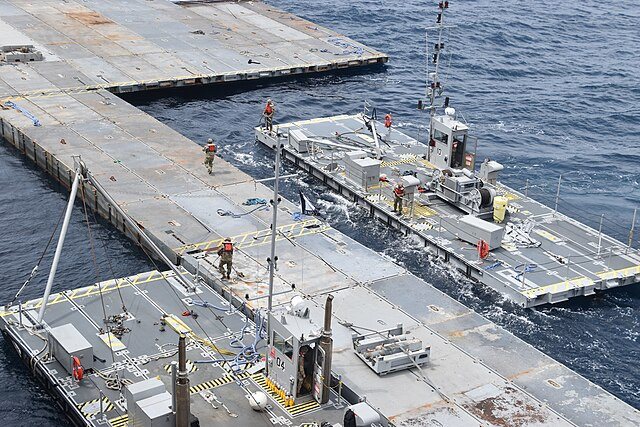The U.S. Department of Defense announced on Thursday that it would shut down its short-lived humanitarian aid pier for Gaza. The $230 million project, initially intended to alleviate the humanitarian crisis in Gaza, has been plagued by logistical issues and inconsistent aid deliveries, prompting the decision to wind down operations.
National Security Advisor Jake Sullivan confirmed the shutdown, stating, "I do anticipate, in relatively short order, we will wind down pier operations." This decision comes after repeated technical and weather-related challenges thwarted efforts to re-anchor the pier to Gaza's shore, as reported by Pentagon Press Secretary Maj. Gen. Pat Ryder.
"The pier and support vessels and equipment are returning to Ashdod where they will remain until further notice," Ryder said. "A re-anchoring date has not been set." This marks the end of a three-month endeavor to provide vital aid to Palestinian civilians amid a deteriorating humanitarian situation in Gaza.
The project had been under review by inspectors general for the Department of Defense and the U.S. Agency for International Development due to damage and the threat of high seas, which led to several operational pauses. Despite these setbacks, the pier facilitated the delivery of nearly 20 million pounds of aid since it became operational in mid-May.
President Joe Biden had announced the construction of the floating causeway during his State of the Union address, aiming to bypass land routes blocked by Israeli Prime Minister Benjamin Netanyahu's government. The pier was seen as a critical component of the U.S. effort to surge assistance into Gaza, particularly as other aid routes closed.
However, the project faced intense criticism from prominent Republicans, who labeled it as wasteful and politically motivated. Senator Ted Cruz (R-Texas) attempted to force a Senate floor vote on a resolution to end the pier's operations under the War Powers Act. This effort was thwarted by Senate Foreign Relations Chair Ben Cardin (D-Md.), who argued that the War Powers Act did not apply to troops conducting a humanitarian mission.
"This is not the appropriate use of the War Powers Act," Cardin stated. "This is somewhat moot because we expect by the end of the month the pier operations are going to cease." The Senate voted 48-46 in favor of Cardin's point of order, effectively scuttling Cruz's measure.
The humanitarian crisis in Gaza continues to worsen, with multiple checkpoints along the Gazan border closed in the wake of Israel's conflict with Hamas. Israeli officials have intensified searches of trucks at open border crossings to prevent weapons smuggling, slowing the entry of essential goods such as food and medicine. "There is an unprecedented horrific humanitarian disaster in Gaza right now, and we've got to do everything we can to make sure that tens of thousands of children do not starve to death," Senator Bernie Sanders (I-Vt.) emphasized.
The U.S. had initially attempted to address these challenges through airdrops and later by installing the pier. However, security concerns have delayed the distribution of aid on the shore, limiting the effectiveness of these efforts.




